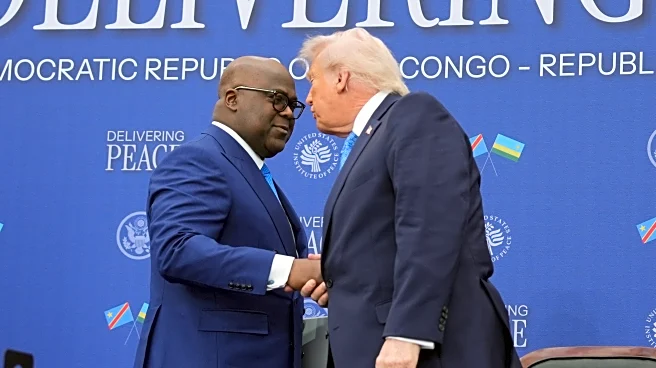What's Happening?
The U.S. government shutdown, now the longest in history, is showing signs of potentially ending this week as bipartisan talks gain momentum. Senators, including Markwayne Mullin and Mike Rounds, have
expressed optimism about reaching a resolution soon. The shutdown, which has lasted 36 days, has been marked by a stalemate between Senate Democrats and Republicans over a short-term spending bill. Democrats have been holding out for a bill that addresses expiring health insurance subsidies, while Republicans have proposed a continuing resolution (CR) to fund the government through November 21. Senate Minority Leader Chuck Schumer has instructed Democrats to wait until after recent elections to avoid affecting voter turnout. House Speaker Mike Johnson has endorsed a plan to extend funding into January, avoiding a December deadline that could lead to a massive omnibus spending package.
Why It's Important?
The prolonged government shutdown has significant implications for federal employees, contractors, and citizens relying on government services. The impasse has affected millions, with Democrats emphasizing the urgency of addressing health insurance subsidies to prevent premium increases. The shutdown has also highlighted political divisions, with Republicans accusing Democrats of using the situation for political leverage. Resolving the shutdown is crucial to restoring government operations and addressing fiscal year spending. The outcome of these negotiations will impact public policy, particularly in healthcare, and could influence political dynamics as parties navigate the shutdown's resolution.
What's Next?
If bipartisan talks succeed, the Senate could vote to reopen the government as early as Wednesday or Thursday. A funding bill would then need approval from the House and President Trump. The focus will be on negotiating a longer-term CR to extend funding into the new year, allowing more time for crafting fiscal year spending bills. The resolution of the shutdown may also lead to discussions on extending Affordable Care Act subsidies, a key issue for Democrats. The political landscape may shift as parties reassess strategies post-shutdown, with potential impacts on upcoming legislative priorities.
Beyond the Headlines
The shutdown has underscored the complexities of bipartisan negotiations and the challenges of balancing fiscal responsibility with social welfare priorities. The debate over health insurance subsidies highlights broader issues in healthcare policy and the need for sustainable solutions. The shutdown's resolution could set precedents for future budget negotiations and influence public perception of party effectiveness in governance.










